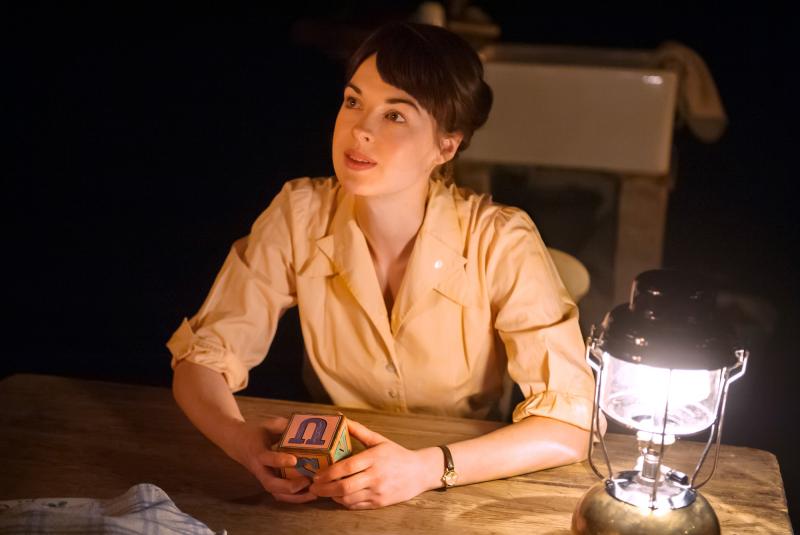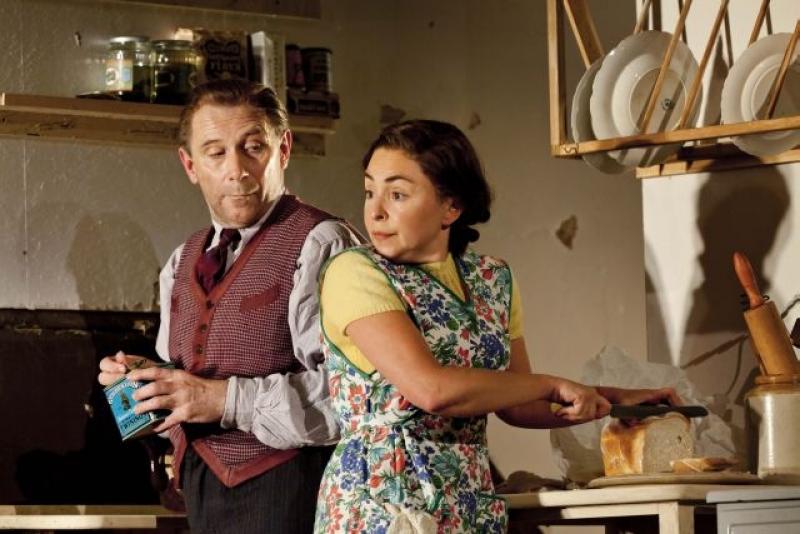Arnold Wesker: His Life and Career in 10 Scenes | reviews, news & interviews
Arnold Wesker: His Life and Career in 10 Scenes
Arnold Wesker: His Life and Career in 10 Scenes
The angry young playwright's career was as dramatic off the stage as on

Of all the dramas with the name Arnold Wesker attached to them, the most absorbing ran as long as The Mousetrap, but offstage rather than on. It was in the style of a remorselessly black farce, in which the little man as hero suffers an endless series of blows, reverses and pratfalls.
Written up as a play, it should be called Fashion Street, after the address in the East End where the playwright was born into a family of Jewish communists in 1932 and about which he wrote in an autobiographical trilogy of early plays in 1958 that established his reputation for writing sharply about the British class system: Chicken Soup with Barley, Roots and I’m Talking about Jerusalem. (“My power of imagination is slight,” he once said in an essay.)
In scene one, the young Wesker is in the RAF doing his National Service, and writing a novel about his experiences. Well-wishers advise him that it is unpublishable. As do publishers. Undeterred, in scene two he turns his attention to the writing of plays, which are initially rejected. But with John Osborne ploughing the furrow for angry young playwrights, they at last find an audience. (Pictured below, Jessica Raine in the Donmar's 2013 production of Roots.) In scene three he writes his fifth play Chips with Everything (1962) – the definitive play about National Service, which he has converted from the unpublishable novel about the RAF. In 1963 it goes to Broadway. Some theatregoers object to a line in which a character says, "You know what happens to Jews? They go to gas chambers." Bookings are cancelled, audiences drop from three-quarters full to half. Wesker argues in his defence that they have not cut the line in Israel. He later discovers that they have. The play closes earlier than expected.
In scene three he writes his fifth play Chips with Everything (1962) – the definitive play about National Service, which he has converted from the unpublishable novel about the RAF. In 1963 it goes to Broadway. Some theatregoers object to a line in which a character says, "You know what happens to Jews? They go to gas chambers." Bookings are cancelled, audiences drop from three-quarters full to half. Wesker argues in his defence that they have not cut the line in Israel. He later discovers that they have. The play closes earlier than expected.
Scene four moves us on a decade to 1972, with the stage split between the National and the RSC. Wesker is 40. His regular director John Dexter is to mount The Old Ones at the National, but Kenneth Tynan withdraws the play, alleging that it cannot be cast from the company. Wesker suspects his play is the victim of a rift between Tynan and Dexter. Meanwhile, in a scenario that could only happen to Wesker, a company of RSC actors refuse to perform his play The Journalists. Wesker suspects that they object to the presence of several intelligent Tory MPs among the dramatis personae. The possibility that they simply hate the play is not contemplated. This is an extreme example of a general trend that can be compositely represented in scene five, in which Wesker complains to a journalist that no one in this country wants to mount his plays any more. It would make thematic sense to have him slag off directors here too.
Scene six apparently brings good news. It is 1977, and a production of Shylock is heading for Broadway. Takings of $2 million are predicted, but then Zero Mostel, a big box-office draw who had appeared in Mel Brooks's The Producers, collapses and dies, and the show goes the same way after nine performances in New York. Dexter and Wesker do not work together again. Having lived off an overdraft for the first 20 years of his career, the playwright will now live off one for at least the next 20. In 1997 he publishes a diary of the debacle entitled The Birth of Shylock and the Death of Zero Mostel. (Pictured below: the National Theatre's 2011 revival of The Kitchen.) Scene seven ushers in the revival phase in the 1990s: an education department production of Roots tours, then goes into the National for a short run; while his debut about working in a kitchen called The Kitchen (1957) is spectacularly mounted at the Royal Court by Stephen Daldry, but for some mysterious reason its author fails to fathom it does not transfer. To publicise this and other later revivals, in interviews Wesker intensifies his complaint that theatres should be mounting his new plays as well as reviving his old ones, while adding that his work is staged all over the world and London is not the only fish in the sea.
Scene seven ushers in the revival phase in the 1990s: an education department production of Roots tours, then goes into the National for a short run; while his debut about working in a kitchen called The Kitchen (1957) is spectacularly mounted at the Royal Court by Stephen Daldry, but for some mysterious reason its author fails to fathom it does not transfer. To publicise this and other later revivals, in interviews Wesker intensifies his complaint that theatres should be mounting his new plays as well as reviving his old ones, while adding that his work is staged all over the world and London is not the only fish in the sea.
In scene eight, the nadir. On the death of Osborne in 1994, Wesker writes an article in the Guardian about their last encounter, at a soiree at Buckingham Palace. Osborne's widow takes offence at Wesker's portrayal of the deceased as a drunkard, and posts his name alongside other personae non gratae on the door at the memorial service, barring entry. It is the most remarkable public humiliation. But very dramatic. In scene nine there would be a conflation of events: a solitary Wesker visits Osborne's grave and explains to his old friend that he at least is mellowing in old age. HTV are filming his play Break, My Heart (1997), about a husband physically abusing his wife, who like Wesker is an autodidact. The channel objects to the amount of swearing and invites its author to lighten the cargo of expletives: they count 62 “fuckings” and one “cunt” and tell Wesker he can have 12 “fuckings” and no “cunt”. He compromises, perhaps for the first time in his life.
In scene nine there would be a conflation of events: a solitary Wesker visits Osborne's grave and explains to his old friend that he at least is mellowing in old age. HTV are filming his play Break, My Heart (1997), about a husband physically abusing his wife, who like Wesker is an autodidact. The channel objects to the amount of swearing and invites its author to lighten the cargo of expletives: they count 62 “fuckings” and one “cunt” and tell Wesker he can have 12 “fuckings” and no “cunt”. He compromises, perhaps for the first time in his life.
Scene 10 covers the last decade. In 2006 Wesker is a guest on Desert Island Discs and given a knighthood. A year earlier he finally makes his debut as a novelist with Honey, which continues the story of Beatie Bryant, the character who illuminated his early trilogy. She is visited again in a pair of revivals either side of the playwright's 80th birthday: Chicken Soup with Barley at the Court in 2011 (pictured above), and finally Roots at the Donmar Warehouse in 2013 starring Jessica Raine. Both plays are universally hailed as masterpieces.
Sir Arnold Wesker, 1932-2016
The future of Arts Journalism
You can stop theartsdesk.com closing!
We urgently need financing to survive. Our fundraising drive has thus far raised £49,000 but we need to reach £100,000 or we will be forced to close. Please contribute here: https://gofund.me/c3f6033d
And if you can forward this information to anyone who might assist, we’d be grateful.

Subscribe to theartsdesk.com
Thank you for continuing to read our work on theartsdesk.com. For unlimited access to every article in its entirety, including our archive of more than 15,000 pieces, we're asking for £5 per month or £40 per year. We feel it's a very good deal, and hope you do too.
To take a subscription now simply click here.
And if you're looking for that extra gift for a friend or family member, why not treat them to a theartsdesk.com gift subscription?
more Theatre
 Ragdoll, Jermyn Street Theatre review - compelling and emotionally truthful
Katherine Moar returns with a Patty Hearst-inspired follow up to her debut hit 'Farm Hall'
Ragdoll, Jermyn Street Theatre review - compelling and emotionally truthful
Katherine Moar returns with a Patty Hearst-inspired follow up to her debut hit 'Farm Hall'
 Troilus and Cressida, Globe Theatre review - a 'problem play' with added problems
Raucous and carnivalesque, but also ugly and incomprehensible
Troilus and Cressida, Globe Theatre review - a 'problem play' with added problems
Raucous and carnivalesque, but also ugly and incomprehensible
 Clarkston, Trafalgar Theatre review - two lads on a road to nowhere
Netflix star, Joe Locke, is the selling point of a production that needs one
Clarkston, Trafalgar Theatre review - two lads on a road to nowhere
Netflix star, Joe Locke, is the selling point of a production that needs one
 Ghost Stories, Peacock Theatre review - spirited staging but short on scares
Impressive spectacle saves an ageing show in an unsuitable venue
Ghost Stories, Peacock Theatre review - spirited staging but short on scares
Impressive spectacle saves an ageing show in an unsuitable venue
 Hamlet, National Theatre review - turning tragedy to comedy is no joke
Hiran Abeyeskera’s childlike prince falls flat in a mixed production
Hamlet, National Theatre review - turning tragedy to comedy is no joke
Hiran Abeyeskera’s childlike prince falls flat in a mixed production
 Rohtko, Barbican review - postmodern meditation on fake and authentic art is less than the sum of its parts
Łukasz Twarkowski's production dazzles without illuminating
Rohtko, Barbican review - postmodern meditation on fake and authentic art is less than the sum of its parts
Łukasz Twarkowski's production dazzles without illuminating
 Lee, Park Theatre review - Lee Krasner looks back on her life as an artist
Informative and interesting, the play's format limits its potential
Lee, Park Theatre review - Lee Krasner looks back on her life as an artist
Informative and interesting, the play's format limits its potential
 Measure for Measure, RSC, Stratford review - 'problem play' has no problem with relevance
Shakespeare, in this adaptation, is at his most perceptive
Measure for Measure, RSC, Stratford review - 'problem play' has no problem with relevance
Shakespeare, in this adaptation, is at his most perceptive
 The Importance of Being Earnest, Noël Coward Theatre review - dazzling and delightful queer fest
West End transfer of National Theatre hit stars Stephen Fry and Olly Alexander
The Importance of Being Earnest, Noël Coward Theatre review - dazzling and delightful queer fest
West End transfer of National Theatre hit stars Stephen Fry and Olly Alexander
 Get Down Tonight, Charing Cross Theatre review - glitz and hits from the 70s
If you love the songs of KC and the Sunshine Band, Please Do Go!
Get Down Tonight, Charing Cross Theatre review - glitz and hits from the 70s
If you love the songs of KC and the Sunshine Band, Please Do Go!
 Punch, Apollo Theatre review - powerful play about the strength of redemption
James Graham's play transfixes the audience at every stage
Punch, Apollo Theatre review - powerful play about the strength of redemption
James Graham's play transfixes the audience at every stage
 The Billionaire Inside Your Head, Hampstead Theatre review - a map of a man with OCD
Will Lord's promising debut burdens a fine cast with too much dialogue
The Billionaire Inside Your Head, Hampstead Theatre review - a map of a man with OCD
Will Lord's promising debut burdens a fine cast with too much dialogue

Add comment